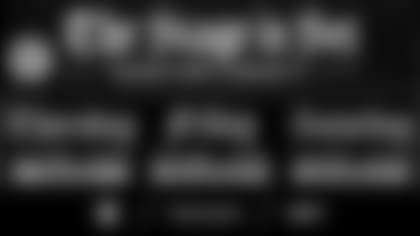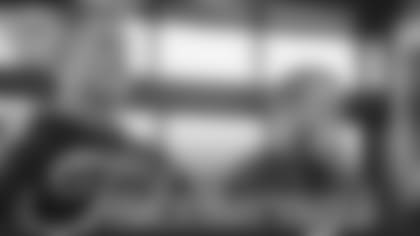ORLANDO, Fla. – The NFL held its annual meeting this week, with the competition committee voting on rule changes among its sessions. There were quite a few for the committee – which Rams head coach Sean McVay is a part of – to discuss.
Here are some of the notable ones that got passed for the 2024 NFL season:
New hybrid kickoff format
The league will be adopting a hybrid kickoff format – for a trial run of the 2024 season – after the vote passed 29-3, NFL Competition Committee chairman Rich McKay told reporters Tuesday. (24 of 32 votes are needed for a rule to pass)
Under the new rules, the kicking and receiving units would each have new alignments. Action off the kickoff would be prompted when the ball lands in a "landing zone" defined as the area between the receiving team's goal line and its 20-yard line.
Kickoffs will still take place from the 35 yard line. However, the remaining 10 players on the kicking unit would line up on the opponent's 40-yard line. Meanwhile, the receiving team would line up at least 7 players in the "setup zone," a five-yard area between their own 35 and 30 yard line. No more than two returners would be allowed to line up in the landing zone.
The kicker can't cross the 50-yard line until ball touches the ground or a player in the landing zone, or go into the endzone. The 10 kicking team players can't move until the ball hits the ground or player in the landing zone or the end zone. Additionally, the receiving team's players in the set-up zone also can't move until the ball has hit the ground or a player in the landing zone or the end zone. The returner(s) are allowed to move at any time before or during the kickoff.
As for the following kickoff scenarios:
- Kickoffs that land in the landing zone must be returned.
- Kickoffs that land in the landing zone and then go into the endzone have to be returned or downed by the receiving team. If downed, it's a touchback to the receiving team's 20-yard line.
- Kickoffs that land in the endzone and stay inbounds are downed, or go out of the back of the endzone (in the air or bounces), would result in a touchback for receiving team at their 30-yard line.
- Kickoffs that fall short of the landing zone would be treated as a kickoff out of bounds, giving the receiving team possession at their 40-yard line.
No fair catch or signal is allowed; officials will blow the play dead. Additionally, if conditions cause ball to fall off tee twice, then kicker will be allowed to use kicking stick to keep the ball.
As for onside kicks, those can only occur in the fourth quarter onward and when a team is trailing, and the intent to do so must be declared to the referee prior to the start of the play clock.
This rule is only in place for 2024 and subject to renewal in 2025.
No more swivel hip-drop tackles
This was approved on Monday, and is the rule is defined as the defender:
- Grabs the runner with both hands or wraps the runner with both arms; and
- Unweights himself by swiveling and dropping his hips and/or lower body, landing on and
trapping the runner's leg(s) at or below the knee.
The penalty for a hip-drop tackle would be 15 yards and an automatic first down.
McKay on Monday said the hip-drop tackle rule will not be reviewable or challengeable.
Other notable rule changes
- Teams are now allowed a third replay challenge after a successful one (out of their first two attempts). In the past, if a team was unsuccessful in one of their two challenges, it negated a third.
- The trade deadline has been pushed back to after Week 9 of the NFL season. Previously, trades have ended after Week 6 of the regular season.
- Replays can now be used if there is"clear and obvious visual evidence" that the game clock expired before any snap.
- If there is a double foul during a down in which there is a change or changes of possession, including if one of the
fouls is a post-possession foul by a team during a scrimmage kick, the team last gaining possession will keep the ball after enforcement for its foul, provided it did not foul prior to last gaining possession ("clean hands").














